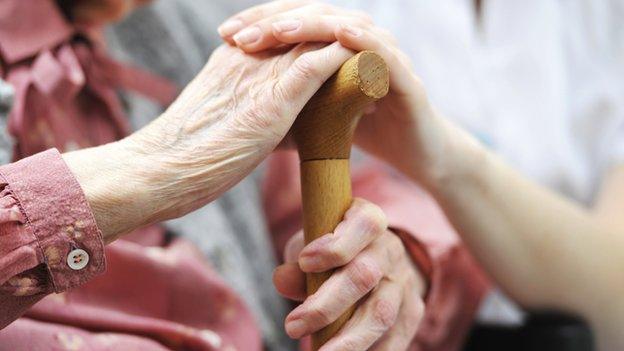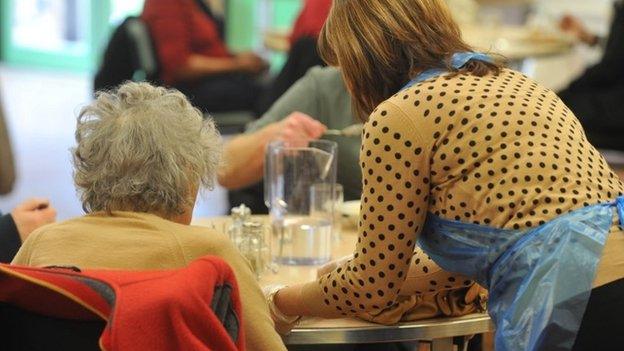One in five care homes 'failing standards'
- Published

5 live Investigates has examined 50 of the inspection reports of homes where standards were not met
One in five care homes for older people in England fail to meet set national standards for safety and care, a report by 5 live Investigates suggests.
Research by healthcare analysts LaingBuisson examined inspection records for almost 10,000 care homes, and found 20% had failed to meet at least one key quality measure.
5 live found cases of residents washed in cold water or left with scabies.
The Care Quality Commission (CQC) called the figures "disappointing".
In October 2014, the care watchdog - the CQC - introduced a new "tougher" inspection regime for care homes.
Following this, the researchers examined 9,816 inspections available on the CQC website in the first week of January this year.
They found 1,829 care homes were not fully compliant on at least one key measure - for example meaning the home might not be deemed safe, could be poorly managed, deemed not caring enough, or may not be responding to a resident's needs.
That means 73,000 residents are in homes where care is substandard.
And 3,500 people are living in 96 homes which failed to meet any of the key tests, the report said.
Homes 'smelt of urine'
5 live Investigates has examined 50 of the inspection reports of homes where standards were not met.
Some homes were found to be placing residents in danger because of insufficient or poorly trained staff.
There were cases where the wrong drugs had been given out. Other homes were dirty, unhygienic or smelt of urine.
In one establishment, dementia patients were being washed in cold water, and staff had not had criminal record checks and worked up to 60 hours a week.

Debbie Westhead, the CQC 's deputy chief inspector for the north region, said the figures were not "good enough".
She said: "The primary responsibility for providing good care lies with the provider. They should know their shortfalls and put those right."
'Auction'
5 live also said there was growing concern that the poor standards in residential homes were linked to the prices paid by some councils for elderly care.
Around a dozen councils now use a web-based commissioning system which invites care homes to bid to provide an individual's care package - in what amounts to an online "auction".
Birmingham City Council invites care providers to submit prices electronically and then shortlists three entries according to pre-defined criteria.
Critics say the process is aimed at driving down costs.
Figures obtained under a Freedom of Information request by Birmingham Care Consortium, which represents care providers, show 92% of care packages commissioned on the system over a six-month period were awarded to the bidder with the lowest price.
The council runs its own quality rating system for care homes on a scale from zero to 100. It defines scores under 60 as "poor".
One in four elderly people placed via its online tendering system were sent to homes officially rated as poor by the council.
The council also commissioned care for 42 elderly residents from homes which had a zero rating on its points-based system.
In a statement, Birmingham Council said: "No placements have been awarded based solely on price without considering the quality of care or provider, weighted 60% on quality and 40% on price.
"Each bid is judged on its own merits ensuring we balance high quality care with the need to achieve value for money."
Lowest price
Kent County Council uses a similar system which awards care packages according to a points-based criteria. Fifty points are awarded for cost, 30 against a self-assessment questionnaire and 20 against key performance indicators.
However, in a presentation to care home providers seen by the BBC, the council stressed: "The higher the price, the lower the score and the less the points awarded."
Kent County Council denies the system is geared towards the lowest price.
Jane Vass of the charity AgeUK said the use of auctioning systems for elderly care was inappropriate.
She said: "No one would want their ageing mum or dad to be 'auctioned'.
"Councils use all sorts of systems when they are procuring goods and services, but it's one thing for them to be, for example, buying computer supplies, quite another when they are organising the future living arrangements for a frail older person."
5 live Investigates will be broadcast on Sunday, 8 February 2015 at 11:00 GMT on BBC Radio 5 live.
- Published28 July 2015
